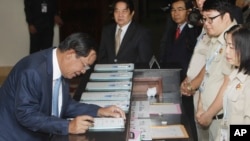Political campaigning in Cambodia’s local elections began on Saturday and has so far passed without incident. Cambodians in Phnom Penh on Monday said they hoped that the election could be conducted fairly and free of violence.
Sim To, a second-year student at Paññāsāstra University of Cambodia, told VOA that he expected there to be some problems with the election, but hoped it would be safe.
“Safety should be prioritized,” he said, “which means there should be not threats from any political parties.”
Path Shakirah, 19, said that if Cambodians were “united, the upcoming election process will be stable and safe.”
In Cambodia’s last election period, between 2012 and 2013, supporters of the ruling Cambodian People’s Party and opposition Cambodia National Rescue Party regularly came to blows.
Prime Minister Hun Sen has regularly warned of “civil war” if the ruling party loses power, but residents of the capital said they were not concerned by the warnings as they thought it was a political strategy and not a credible threat.
Eang Chanboramey, 18, said she did not believe conflict could break out of Hun Sen lost power due to its position in ASEAN, the regional political grouping, and the loss of business if conflict broke out.
Khun Vibol, a 45-year-old sculptor, said: “It cannot happen. It doesn’t matter who wins the election. We are not in the 60s or the 70s. It is normal that politicians say something to attract people’s votes.”
Katina Adams, a U.S. State Department spokeswoman, called on the government to encourage freedom of expression in the elections.
Some 50,000 members of the security forces will be deployed to guard polling stations on election day.







